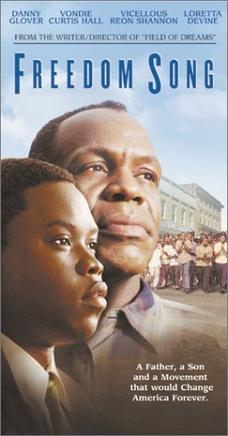Freedom Song (film)
| Freedom Song | |
|---|---|

Video cover
|
|
| Written by | Phil Alden Robinson Stanley Weiser |
| Directed by | Phil Alden Robinson |
| Starring | Danny Glover Vicellous Reon Shannon Vondie Curtis-Hall Loretta Devine Glynn Turman |
| Theme music composer | James Horner |
| Country of origin | United States |
| Original language(s) | English |
| Production | |
| Producer(s) | Phil Alden Robinson Danny Glover Carolyn McDonald Sean Daniel |
| Cinematography |
John Lindley Amy Vincent |
| Editor(s) | Maysie Hoy |
| Running time | 112 minutes |
| Production company(s) | Turner Films, Inc. |
| Release | |
| Original network | Turner Network Television |
| Original release |
|
Freedom Song (2000) is a made-for-TV film based on true stories of the Civil Rights Movement in Mississippi in the 1960s. It tells the story of the struggle of African Americans to register to vote in the fictional town of Quinlan. In the midst of the Freedom Summer, a group of high school students in the small town are eager to make grassroots changes in their own community. The young activists meet resistance not only from white southerners, but from their parents, who have experienced firsthand the violence that can result from speaking out. As high school students band together with the support of the Student Nonviolent Coordinating Committee, they make strides in registering African-American voters and gaining awareness for their cause.
The film was made for TV and released in 2000 on TNT TV channel in the United States. It was written and directed by Phil Alden Robinson, and co-written by Stanley Weiser. Winner of the Image Award, Writers Guild of America award, and Golden Gate Award, it stars Danny Glover, Vicellous Reon Shannon, and Vondie Curtis-Hall.
Freedom Song is told in flashbacks from the perspective of Owen Walker, a high school student in the fictional town of Quinlan, Mississippi in the early 1960s. Growing up in an insulated black community, Owen is oblivious to the white supremacy that still reigned in his town until he has a run-in with racists at a local bus station. While waiting for the bus, five-year-old Owen wanders unknowingly into the "Whites Only" diner. His father, Will, soon follows quickly behind and is forced by white diner attendants to spank his son in public. Will later tells his son, "someday you'll be eating at this counter". But this scene of public humiliation leaves a lasting scar on their relationship.
...
Wikipedia
